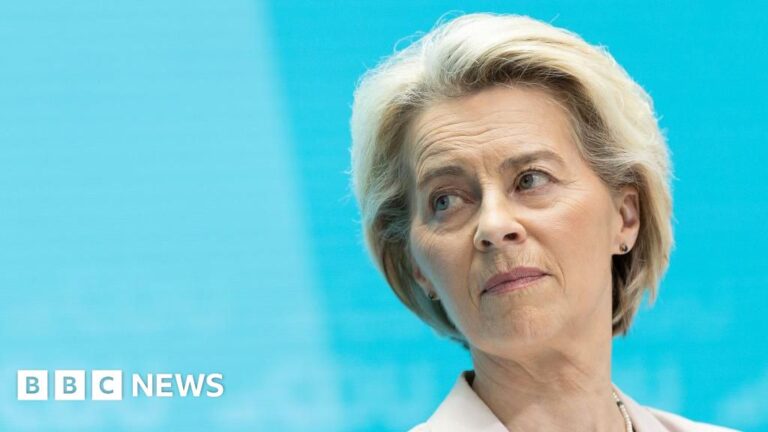European leaders are to announce their picks for the EU’s top jobs at a two-day summit in Brussels, with current Commission President Ursula von der Leyen expected to be nominated for a second term mandate.
Also at the summit is Ukrainian President Volodymyr Zelensky, who thanked EU leaders for opening accession negotiations with his country earlier this week.
Other topics on the agenda include security and defense, with the leaders of Poland and the Baltic countries requesting funds from the EU to build a defense line along their border with Russia.
Earlier this week it emerged that six European leaders had reached a consensus on the names to be put forward – each of them from one of the three parties that dominate the European Parliament.
Ms von der Leyen, of the centre-right European People’s Party (EPP), is tipped for another five years as president of the European Commission, while former Portuguese prime minister Antonio Costa, of the Socialists and Democrats (S&D), could be given the post of president of the European Council.
Kaja Kallas, a member of the centrist Renew Europe party and current Estonian Prime Minister, could be the EU’s High Representative for Foreign Policy.
The six EU leaders who negotiated the names also each represent the EPP, S&D or Renew.
They were the Greek Kyriakos Mitsotakis, the Polish Donald Tusk for the EPP, the Spaniard Pedro Sánchez and the German Olaf Scholz for the Socialists, as well as the French Emmanuel Macron and the Dutch Mark Rutte for Renew.
Italian Prime Minister Giorgia Meloni, who leads the right-wing European Conservatives and Reformists (ECR) bloc, was notably not included in the negotiations – despite the fact that the ECR supplanted Renew as the third largest group in Parliament European after the European elections. earlier this month.
Speaking to the Italian Parliament on Wednesday, Ms Meloni angrily declared that European voters had asked the EU to “take a different path from the one it has taken so far”.
Without naming names, she criticized “those who argue that citizens are not mature enough to make certain decisions, and (who believe) that oligarchy is essentially the only acceptable form of democracy.”
Earlier this week, Hungary’s Viktor Orban also expressed his dissatisfaction with other European leaders.
Writing on
“Instead of inclusion, it sows division,” Orban said, adding that top EU officials should represent “all member states, not just leftists and liberals!”
On Thursday morning, Ms. Meloni’s allies told reporters in Brussels that she had not yet decided whether she would support the new leadership team.
However, even with Mr Orban’s potential backing, Ms Meloni would not have the power to veto nominations for top posts, as that would require buy-in from a majority of EU leaders.
But Ms Meloni has acquired significant status among the European right, and Ms von der Leyen is unlikely to want to upset her at the start of a second term.
Ahead of the summit, members of Ms von der Leyen’s EPP group struck a conciliatory tone, with Polish Prime Minister Donald Tusk telling reporters: “There is no Europe without Italy and there is no no decision without Prime Minister Meloni, that’s obvious.”
Italy could also be offered a senior position in the next Commission in exchange for approval at today’s summit. Each EU member state is assigned a commissioner, but certain portfolios, such as the economy or competition, are the most coveted.
In a letter to EU leaders on the eve of the Brussels summit, Ms von der Leyen also promised to do more to tackle illegal immigration, which is one of Ms Meloni’s main concerns.
If she is officially named as EU leaders’ preferred candidate for president of the European Commission, Ms von der Leyen would then need to be approved by a majority of members of the European Parliament in a session likely to take place at the mid-2017. July.
Ms von der Leyen will be supported by all 190 members of her EPP group, but she will also need to secure the support of other political groups to secure a majority of 361.


